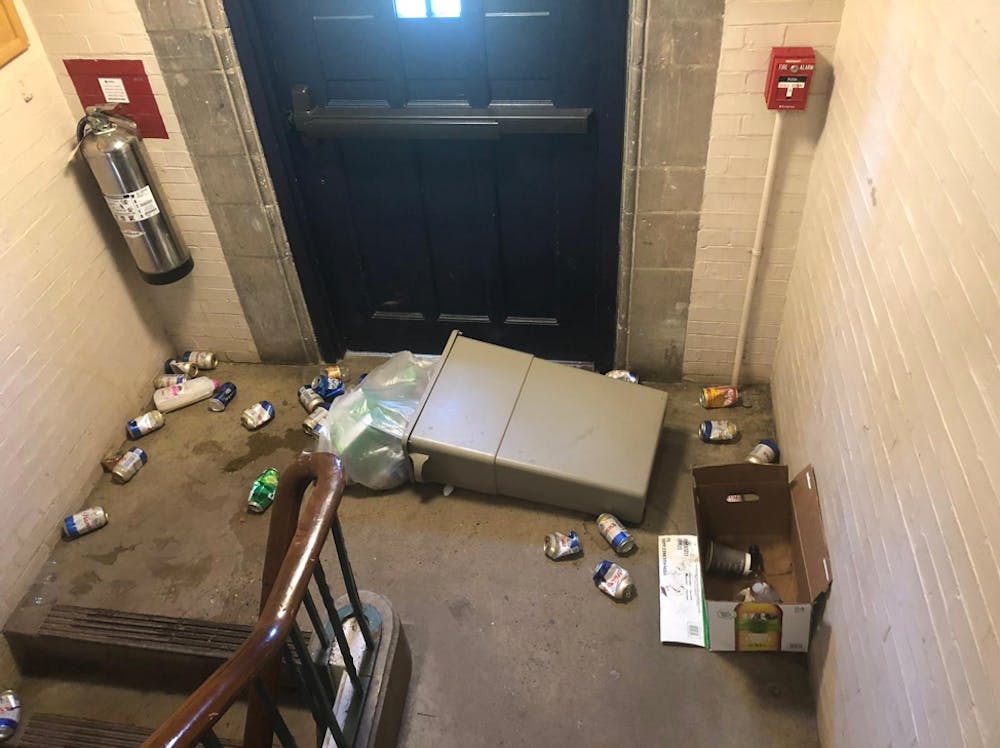It is no surprise to find dorm buildings in poor condition Sunday mornings, be it trash left around the bathrooms, vomit in the hallways, or beer cans and cups forming a path to Prospect Avenue. Yet, the morning of Sunday, April 7, was particularly disgusting. Throughout the “Slums,” the level of disarray was so extreme, it was a safety hazard.
Trash littered so much of the space that it was hard to navigate the filth. Bathrooms had so many paper towels on the ground that it appeared as if someone had been trying to stop a flood. Outside, there was an absurd amount of debris, from beer cans to chairs, even before the remnants of Sunday Funday appeared hours later. At that point, the courtyard was in such astonishing dilapidation that visitors were stopping to take pictures. This behavior is unsafe, entitled, and unacceptable, and measures to fix it must be taken, even if they are necessarily intrusive.
When a dorm community is unable to keep its degeneracy below a tolerable level, we must have a response — one that encourages both direct, student-based action and swift punishment for rule breakers. Trade-offs between privacy and accountability are necessary when students are clearly so self-absorbed that they act without any respect for their neighbors’ right to not live in a dump.
While it should hopefully be obvious, there are many reasons the behavior described above is so blatantly, obnoxiously horrid. It poses a safety risk to all residents and facilities staff. Glass bottles, beer cans, and trash distributed throughout the hallways, or tucked away in the grass, are tripping and glass hazards, especially near stairwells, where someone could fall several stories. The risk is heightened for the many intoxicated students walking through the Slums.
Moreover, it is incredibly rude to the staff who have to pick up after students who behave as if there are no consequences to their actions. It is pathetic that some students have such little respect for others that they are totally content throwing their paper towels all over the place or leaving their vomit in the stairwell for several days instead of calling facilities. This only makes it even harder for these workers to clean up when they finally see the destruction on Monday. Yes, it is their job to clean, but it is our job to behave like adults: it’s not like we are so inept at cleaning up our own vomit that we need to be put in daycares so that someone else can do it for us like we are small children.
If someone wants to wreck his own dorm, fine, but it is a whole other situation to wreck a common space like a courtyard, hallway, or bathroom. We do not need such depravity on our campus. This is not even addressing the absurdity of noise on certain nights, with some people intentionally leaving their dorm pre-games to scream in the hallway, seemingly to ensure that anyone trying to sleep cannot do so. Ultimately, some dorm buildings can reach a point where the conditions are so bad that the University and the campus community need to take drastic actions.
As dorm residents, what can we do? Well, the first thing we must do is have the courage to intervene and tell people who are causing safety concerns to stop their behavior and pick up their mess. Yet, this raises an ethical dilemma. Yes, it is absolutely beneficial to the whole community if a person intervenes to stop someone else from making a mess, just as it is great for someone to pick up trash that he himself did not litter onto the ground; it is also no one’s fault but the perpetrator’s, and therefore it is difficult to claim that bystanders have an actual obligation to step in and help.
This mentality forces innocent people to involve themselves when it may be the case that no one else is in immediate danger of falling or anything of the sort. So, yes, it would be great for someone to speak up to another person who is trashing our campus. It would also be great to take additional steps, such as reporting them to either a dean or to someone else if someone does something so obnoxious as knocking over an entire trashcan and refusing to pick it up. However, this may not be enough to stop such extraordinarily harmful practices from persisting, and this is why the University may at times need to take additional measures, especially since students are naturally apprehensive about intervening.
There comes a point where the University needs to put into place a system to catch perpetrators who engage in such intensely troublesome behaviors. The most effective system would be one which involves placing security cameras in and around the dorm in question until students no longer act so horrendously. University staff, when alerted to an incident such as a knocked-over trash can, could go back and watch footage from the camera and identify which students were involved, and whether or not it appears that they were intentional in their actions.
If so, they should be subject to the same violations as someone who commits a fire safety violation — namely, after a warning, being required to do a form of community service with facilities workers, as I outlined in my previous column. There are definitely privacy concerns when installing cameras, which is why this should absolutely be a last resort to extreme, hazardous uncleanliness. Similarly, the University should remove the cameras once there ceases to be a problem. Nonetheless, when our facilities workers are intensely disrespected, and when innocent students are put in harm’s way by people so inconsiderate that they cannot pick up their own trash, there have to be consequences.
Hunter Campbell is a junior politics major from Sunderland, Vt. He can be reached at hunterc@princeton.edu.









